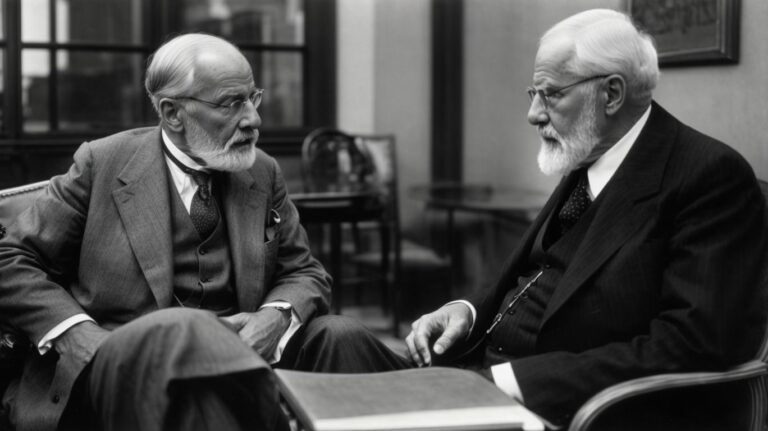Psychology, the study of the mind and behavior, is a fascinating field that intersects with science in various ways.
In this article, we will explore the connection between psychology and science, how psychologists utilize the scientific method, and the impact of scientific advancements on the field of psychology.
We will delve into the different branches of psychology, how psychologists conduct research through observational studies, surveys, and experimental studies, and the ethical considerations involved in psychological research.
Join us as we unravel the intricate relationship between psychology and science.
Contents
- 1 What Is Psychology?
- 2 What Is Science?
- 3 What Is the Relationship Between Psychology and Science?
- 4 What Are the Different Branches of Psychology?
- 5 How Do Psychologists Conduct Research?
- 6 What Ethical Considerations are Involved in Psychological Research?
- 7 Frequently Asked Questions
- 7.1 1. What is the relationship between psychology and science?
- 7.2 2. How does psychology use scientific methods?
- 7.3 3. Can psychology be considered a “hard” science?
- 7.4 4. How does psychology contribute to scientific research?
- 7.5 5. What are some criticisms of the relationship between psychology and science?
- 7.6 6. How can understanding the relationship between psychology and science benefit society?
What Is Psychology?
Psychology is the scientific study of the human mind, behavior, and mental processes within the context of different environments.
Understanding behavior, cognition, and emotions is at the core of psychology, striving to unravel the complexities of why individuals think, feel, and act the way they do. Through observation, experimentation, and analysis, psychologists delve into the intricacies of human behavior. They explore various aspects such as memory, perception, attention, and decision-making to decode the underlying mechanisms driving human actions. Psychology emphasizes the significance of environmental influences, acknowledging how surroundings, culture, and social interactions shape individuals’ psychological makeup and responses.
What Is Science?
Science encompasses the systematic study of the natural world through observation, experimentation, and the formulation of theories based on empirical evidence and logical reasoning.
Through the process of experimentation, scientists test hypotheses to validate or reject potential explanations for natural phenomena. This empirical approach allows them to gather data, analyze results, and draw conclusions that contribute to the ever-evolving body of scientific knowledge.
- Observation
plays a fundamental role in driving scientific inquiry, providing the basis for formulating research questions and designing experiments. It is through keen observation that scientists identify patterns, relationships, and anomalies, sparking curiosity and prompting further investigation.
What Is the Relationship Between Psychology and Science?
The relationship between psychology and science lies in the application of scientific methods to study human behavior, cognition, and the underlying neurobiological mechanisms that shape psychological processes.
By embracing the lens of determinism, psychologists strive to understand how past experiences and biological factors influence human behavior. This emphasis on causality forms the foundation of psychological research, allowing for the investigation of why individuals behave the way they do.
Through the collection and analysis of empirical evidence, psychologists rely on observable data to test hypotheses and draw conclusions about human cognition and behavior. This rigorous approach ensures that psychological theories are grounded in scientific validity, enhancing the reliability of findings.
The integration of neurobiological perspectives enriches our understanding of the relationship between the brain and behavior. By examining the neural processes that underpin psychological phenomena, researchers can elucidate how the brain influences thoughts, emotions, and actions.
How Do Psychologists Use the Scientific Method?
Psychologists employ the scientific method by formulating hypotheses, conducting empirical observations, and analyzing data to test theories and gain insights into human behavior.
The process starts with identifying a question or topic of interest. This is followed by the formulation of a hypothesis, which is a testable prediction based on existing knowledge. Once the hypothesis is established, psychologists then design and conduct experiments or studies to collect data through observations and measurements.
The next step involves systematically analyzing the collected data using statistical methods to draw conclusions and interpret the findings. This critical evaluation of results helps researchers understand patterns, relationships, and potential causes underlying human behavior.
By rigorously following these steps, psychologists can contribute to the advancement of psychological knowledge and the development of effective interventions and treatments in various areas of human psychology.
How Has Science Influenced the Field of Psychology?
Science has significantly influenced psychology by providing insights into genetic, endocrinological, and neurological factors that contribute to personality development and behavior.
Understanding human behavior has been greatly enriched by the intersection of psychological theories with scientific discoveries in genetics, endocrinology, and neurology. The field of genetics has shed light on hereditary traits and how they impact behavior, while endocrinology has shown the role of hormones in influencing mood and cognitive processes. Neurology has revealed the intricate workings of the brain and its correlation with various psychological phenomena. This multidisciplinary approach has allowed for a more holistic understanding of the complex interplay between biological factors and psychological processes, deepening our comprehension of human behavior.”
What Are the Different Branches of Psychology?
Psychology encompasses various branches that focus on behavior, cognitive functions, social interactions, and the physiological underpinnings of mental processes.
Behavioral psychology examines how behavior is influenced by environmental factors and experiences, seeking to understand the determinants of actions and reactions.
Cognitive psychology delves into mental processes such as perception, memory, and problem-solving strategies, shedding light on how individuals process information.
Social psychology explores how individuals interact with others, studying interpersonal relationships, group dynamics, and societal influences on behavior.
Physiological psychology investigates the biological basis of behavior, studying brain functions, neurotransmitters, and the impact of neurobiological mechanisms on mental processes.
Behavioral Psychology
Behavioral psychology examines how behavior is shaped by external stimuli, rewards, and cognitive processes, drawing insights from philosophical and empirical perspectives.
One of the core principles of behavioral psychology is the understanding that behavior can be reinforced or lessened through the application of particular rewards. This concept, known as operant conditioning, was pioneered by B.F. Skinner, who demonstrated the powerful impact of positive and negative reinforcement on behavioral outcomes.
Intelligence also plays a significant role in the learning process within behavioral psychology. Individuals with higher cognitive abilities often exhibit quicker acquisition of new behaviors and may be more adept at understanding the consequences of their actions.
Cognitive Psychology
Cognitive psychology explores mental processes such as perception, memory, and reasoning, diving into neuroanatomical structures and philosophical concepts to understand cognitive functions.
In the study of cognitive psychology, researchers closely examine the complex interplay between different areas of the brain and how they contribute to functions like attention, language, and problem-solving.
The metaphysical aspects of cognition delve into questions about the nature of thought and consciousness, offering insights into how our minds process information and make sense of the world.
Through empirical investigations on perception and memory, cognitive psychology sheds light on the mechanisms behind mental processes, revealing the intricate ways our brains encode, store, and retrieve information.
Developmental Psychology
Developmental psychology focuses on the progression of human growth, considering ontological aspects of development, societal influences, and the realization of human potential.
One critical element that developmental psychologists explore is the role of nature versus nurture in shaping an individual’s growth. This ongoing debate delves into whether genetics or environmental factors have a greater impact on development.
The impact of societal norms, cultural beliefs, and familial dynamics cannot be overlooked. These external influences play a significant role in shaping an individual’s identity, behavior, and cognitive abilities.
Within social contexts, individuals navigate through various stages of development, each presenting unique challenges and opportunities for growth. These stages, such as infancy, childhood, adolescence, and adulthood, bring forth different milestones and transitions that contribute to the holistic development of a person.
Social Psychology
Social psychology investigates how individuals interact with society, drawing connections between sociology and psychology, and exploring topics like the serenity prayer and logical reasoning.
Understanding the societal influences on individual behavior is a crucial aspect of social psychology. It delves into how society shapes our thoughts, emotions, and actions, and how we, in turn, contribute to the fabric of society. By examining the philosophical concepts embedded in social interactions, such as the serenity prayer, we gain insights into acceptance, courage, and wisdom in the face of societal pressures. The application of logic in understanding social dynamics helps unravel complex patterns of behavior, norms, and beliefs, shedding light on the intricate tapestry of human interactions.”
Clinical Psychology
Clinical psychology focuses on diagnosing and treating mental health disorders, drawing insights from physiological, biological, and educational perspectives to provide therapeutic interventions.
Through a comprehensive understanding of human behavior and cognitive processes, clinical psychologists utilize various assessment tools and therapeutic techniques to help individuals cope with emotional distress and behavioral issues.
Therapy sessions often involve cognitive-behavioral interventions, psychodynamic approaches, or mindfulness practices tailored to each unique patient. Clinical psychologists work closely with other mental health professionals, such as psychiatrists and social workers, to ensure multidisciplinary care for individuals experiencing complex psychological conditions. Cutting-edge research and innovative therapies continually shape the evolving landscape of clinical psychology.
How Do Psychologists Conduct Research?
Psychologists employ various research methods such as observational studies, surveys, and experiments to investigate topics related to learning, cognition, and human behavior.
Observational studies involve psychologists observing and documenting behavior in natural settings without interference. This method offers insights into real-world behaviors without artificial alterations.
Surveys, on the other hand, use questionnaires to gather data about participants’ attitudes, beliefs, and behaviors. These can provide a wide range of responses quickly but may be limited by self-reporting biases.
Experimental designs allow psychologists to manipulate variables and observe their effects on behavior. This controlled method helps establish cause-and-effect relationships, crucial in understanding complex phenomena.
Observational Studies
Observational studies in psychology involve the systematic observation of behaviors and academic performance to understand factors influencing grades, performance standards, and college success.
Researchers utilize various observational methodologies such as naturalistic observations, structured observations, and participant observations to gather rich data on student interactions, study habits, and learning environments. By closely monitoring student behaviors, educators can gain insights into how study habits, motivation levels, and classroom dynamics affect academic outcomes.
These studies often focus on variables like socio-economic background, parental involvement, teacher-student relationships, and extracurricular activities, which are known to impact student success in college. Through these observations, researchers can identify patterns and trends that contribute to effective educational practices and interventions.
Surveys and Questionnaires
Surveys and questionnaires are essential tools in psychological research, aiding in the assessment of exam performance, motivation levels, and intelligence quotients.
In the realm of exam assessments, surveys and questionnaires play a crucial role in gauging students’ knowledge retention, understanding of concepts, and overall academic progress. They allow researchers to collect quantitative and qualitative data to analyze factors influencing test scores and academic achievements.
In terms of motivation studies, these tools help psychologists delve into the underlying reasons driving individuals towards specific goals or tasks. By examining responses to motivational questionnaires, researchers can identify patterns, behaviors, and psychological factors affecting individuals’ drive and perseverance.
Experimental Studies
Experimental studies in psychology explore topics such as neurobiological influences on learning, motivation factors, and cognitive processes through controlled experiments.
These studies delve deep into the intricate workings of the human mind, investigating how our brains respond to various stimuli and how these responses shape our behaviors.
Researchers design experiments to test theories on memory retention, attention span, and decision-making processes, shedding light on the underlying mechanisms driving human thought and behavior.
By meticulously controlling variables and implementing innovative methodologies, psychologists can draw valuable insights into the complex interplay between biology and behavior.
What Ethical Considerations are Involved in Psychological Research?
Psychological research involves ethical considerations related to the treatment of participants, societal implications, and the realization of human potential within research settings.
One fundamental ethical consideration in psychological research is the protection of participant rights, ensuring informed consent, confidentiality, and the right to withdraw at any point. Researchers must weigh the benefits of their study against any potential harm to participants. Studies should aim to benefit society and avoid perpetuating harmful stereotypes or biases.
In the pursuit of uncovering human potential, psychologists must conduct their research with integrity, transparency, and a commitment to fostering positive outcomes for individuals and communities. Ethical guidelines serve as a compass, guiding researchers in navigating complex moral dilemmas that may arise during the course of their studies.
Frequently Asked Questions
1. What is the relationship between psychology and science?
The relationship between psychology and science is a complex and constantly evolving one. Psychology is considered a social science, utilizing scientific methods and theories to understand human behavior and mental processes.
2. How does psychology use scientific methods?
Psychologists use a variety of scientific methods, such as experiments, observations, and surveys, to collect and analyze data in order to test hypotheses and theories about human behavior and mental processes.
3. Can psychology be considered a “hard” science?
While psychology does use scientific methods, it is often considered a “soft” science due to the subjective nature of studying human behavior and mental processes. However, many advancements in neuroscience and technology have allowed psychology to become more data-driven and closer to “hard” sciences.
4. How does psychology contribute to scientific research?
Psychology contributes to scientific research by using its unique perspective and methods to study human behavior and mental processes. This research can then be applied to a variety of fields, including medicine, education, and business.
5. What are some criticisms of the relationship between psychology and science?
Some criticisms include the use of subjective measures, the lack of generalizability of findings, and the replication crisis in psychological research. There are also debates about the ethical implications of certain research methods in psychology.
6. How can understanding the relationship between psychology and science benefit society?
By understanding the relationship between psychology and science, society can better understand and address issues related to human behavior and mental health. It can also lead to advancements in various industries, such as healthcare and technology, as well as help individuals improve their overall well-being.




